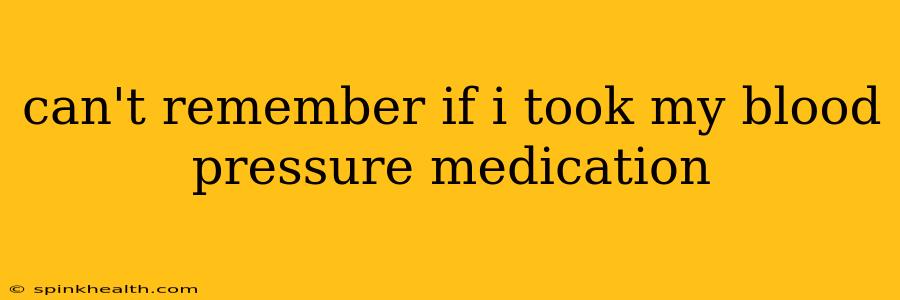The Heart-Stopping Question: Did I Take My Blood Pressure Meds?
It's a familiar feeling: that nagging uncertainty, that tiny voice whispering, "Did I take my blood pressure medication this morning?" The worry can be intense, especially if you rely on these medications to manage a serious health condition. This isn't about blame; it's about understanding how to manage this common situation and prevent future lapses. Let's dive into the reasons why this happens, how to handle it, and strategies to prevent it from becoming a regular occurrence.
Why Do We Forget to Take Our Medication?
Forgetting to take medication is more common than you think. Life gets busy, routines get disrupted, and sometimes, even the most conscientious individuals experience lapses in memory. Stress, illness, and even changes in sleep patterns can all play a role. It's not a sign of weakness or forgetfulness; it's a human experience. The key is to understand why it happens so you can proactively address it.
What Should I Do If I Think I Forgot My Blood Pressure Medication?
Don't Panic. First and foremost, take a deep breath. While forgetting can be unsettling, panicking won't help. Here's a step-by-step approach:
- Check your pill organizer: If you use a pill organizer, this is the easiest way to confirm whether you took your medication.
- Look for empty medication blister packs: This is another quick visual check.
- Review your medication log: If you keep a medication log (highly recommended!), this will provide a definitive answer.
- Check your pharmacy refill records: Your pharmacy may have digital records that show when you last filled your prescription. This isn't a foolproof method, as it only reflects the dispensing, not whether you actually ingested the medication.
- Monitor your blood pressure: If possible, check your blood pressure. While this won't definitively confirm whether you took your medication, a significantly elevated reading might suggest you missed a dose. However, blood pressure fluctuates naturally, so don't solely rely on a single reading.
- Contact your doctor or pharmacist: If you're still unsure, contacting your healthcare provider is the best course of action. They can provide guidance specific to your medication and health condition. They may advise against taking a double dose, depending on the type of medication.
Crucially, never double up on your medication without first consulting your doctor or pharmacist. Taking too much medication can be just as dangerous as taking too little.
How Can I Prevent Forgetting My Medication in the Future?
Preventing medication forgetfulness requires a proactive approach:
- Use a pill organizer: These come in various forms, from simple weekly organizers to sophisticated electronic pill dispensers.
- Set reminders: Utilize alarm clocks, smartphone reminders, or even medication reminder apps.
- Establish a routine: Tie taking your medication to a daily routine, like brushing your teeth or having breakfast.
- Keep your medication in a visible location: Don't stash it away in a drawer or cabinet where it's easily forgotten.
- Involve a caregiver or family member: Ask a loved one to help you remember or monitor your medication.
- Medication log: Maintain a detailed record of when you take your medication. This provides a simple, clear history.
- Consider smart pill dispensers: These devices offer reminders and track your medication usage, alerting caregivers if doses are missed.
Is it Dangerous to Miss a Dose of Blood Pressure Medication?
The consequences of missing a dose of blood pressure medication can vary depending on several factors: the type of medication, the severity of your hypertension, and how long you've been taking the medication. Missing a single dose might not have a significant impact, but consistently forgetting doses can lead to dangerously elevated blood pressure, increasing your risk of stroke, heart attack, and other cardiovascular complications.
What are the Side Effects of Missing a Blood Pressure Medication Dose?
The side effects of missing a dose will depend greatly on the medication, but generally may include a sudden increase in blood pressure, headache, dizziness, and anxiety. If you experience these symptoms after you realize you missed a dose, contact your doctor immediately.
This information is for general knowledge and shouldn't replace professional medical advice. Always consult your doctor or pharmacist before making any changes to your medication regimen. Managing your blood pressure effectively is crucial for your long-term health and well-being. Don't hesitate to seek help if you're struggling to remember your medications. Your health is worth it.

